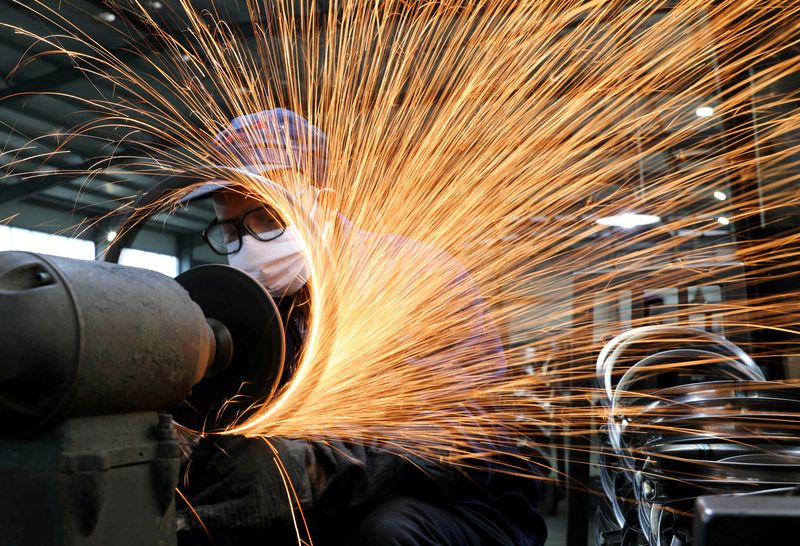ADB warns China it risks wasting money on state-led growth
2023.05.18 09:11

© Reuters. FILE PHOTO: A worker wearing a face mask works on a production line manufacturing bicycle steel rim at a factory, as the country is hit by the novel coronavirus outbreak, in Hangzhou, Zhejiang province, China March 2, 2020. China Daily via REUTERS
By Joe Cash
BEIJING (Reuters) – China needs to level the playing field between private and state owned firms, the Asian Development Bank’s chief economist said on Thursday, adding that the world’s second-largest economy risks “wasting a tonne of money” with a state-led growth model.
“If you just try to use brute force, spend your investment in a few companies that are not really facing a lot of competitive pressure, those policies, usually they often don’t yield much return for your money,” Albert Park told Reuters in his first trip to Beijing since COVID restrictions were lifted.
The Manila-based lender “consistently” raises with China the importance of improving the business environment and the sustainability of the country’s development, he said, while noting that a one percentage increase in growth in China can increase growth in developing Asia by 0.3%.
The comments come amid growing signs that China’s post-COVID economic recovery is losing steam, intensifying pressure on policymakers to shore up wobbly growth.
April industrial output, retail sales, and property investment data this week disappointed investors. Private fixed-asset investment rose only 0.4% last month, in sharp contrast to the 9.4% jump in investment by state entities, indicating weak business confidence.
“I feel China does need to move towards really creating a dynamic private sector with open market competition because that’s how you generate innovation,” Park said.
“If you look at the history of China’s economic development, a lot of the gains in growth, productivity, and employment have come from the non-state sector,” he added.
Youth unemployment hit a record high of 20.4% in April.
Park remains optimistic, however, that policymakers will implement further reforms. Not least, so that China can meet the accession requirements of the Comprehensive and Progressive Agreement for Trans-Pacific Partnership, an aim China’s commerce minister reiterated to his Australian counterpart in Beijing last Friday.
“I think you should take them at their word,” Park responded when asked how China could expect to join the free trade bloc while appearing to place state-owned enterprises at the centre of its economic recovery.
“China has always, like many of the countries in Asia, been very supportive of multilateral open trading systems,” he said, pointing to how China is already a member of the Regional Comprehensive Economic Partnership.








